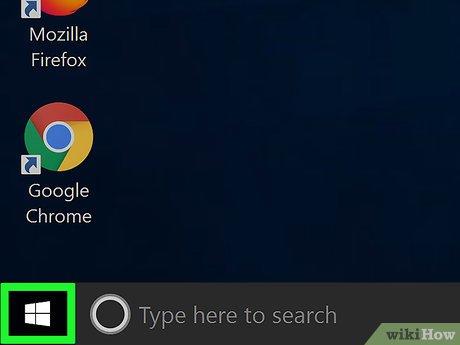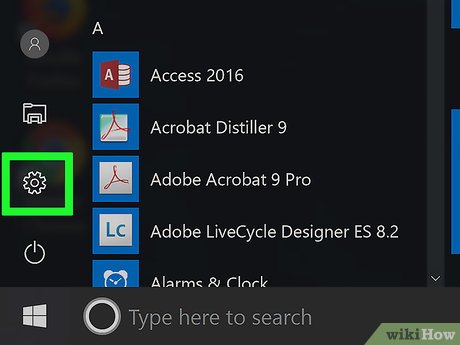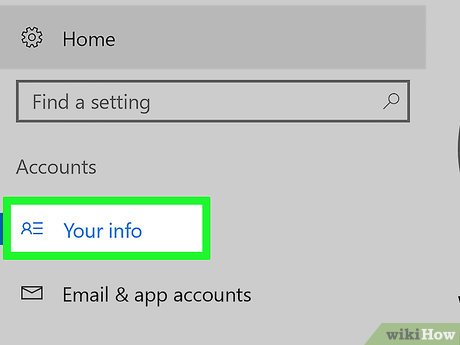How to Find or Change My Computer's Administrator
Method 1 of 2:
On Windows
-
 Open Start. Either click the Windows logo in the bottom-left corner of the screen or press the ⊞ Win key.
Open Start. Either click the Windows logo in the bottom-left corner of the screen or press the ⊞ Win key.
-
 Open Settings. Click the gear-shaped icon in the bottom-left side of the Start menu to do so.
Open Settings. Click the gear-shaped icon in the bottom-left side of the Start menu to do so.
-
 Click Accounts. This person-shaped icon is in the middle row of options.
Click Accounts. This person-shaped icon is in the middle row of options. -
 Click Your info. It's a tab in the upper-left side of the Settings window. Doing so will display your profile information.
Click Your info. It's a tab in the upper-left side of the Settings window. Doing so will display your profile information. -
 Look for the "Administrator" tag beneath your name. Your profile name is at the top of this page; if you see "Administrator" beneath your name and email address, you're on an administrator account.
Look for the "Administrator" tag beneath your name. Your profile name is at the top of this page; if you see "Administrator" beneath your name and email address, you're on an administrator account.- If you're not using an administrator account, you can't make changes to other user accounts.
-
 Click Family & other people. It's a tab on the left side of the window.
Click Family & other people. It's a tab on the left side of the window.- If you don't see this option on the left side of the window, your account doesn't have administrator permissions. Skip to the last step to see how you can find out the name of your computer's administrator account.
-
 Click a user's name or email address. This option will be below either the "Other people" or the "Your family" heading.
Click a user's name or email address. This option will be below either the "Other people" or the "Your family" heading. -
 Click Change account type. It's a button below the user's name or email address.
Click Change account type. It's a button below the user's name or email address. -
 Click the drop-down box. It's below the "Account type" heading.
Click the drop-down box. It's below the "Account type" heading. -
 Click Administrator. You'll see this option at the top of the pop-up menu.
Click Administrator. You'll see this option at the top of the pop-up menu.- Alternatively, click Standard user to revoke administrator privileges.
-
 Click OK. This will save your changes and apply administrator privileges to your selected user.
Click OK. This will save your changes and apply administrator privileges to your selected user. - Find the administrator account from a standard account. If you're not on an administrator account, you can still find out the name and/or email address of the person who is by triggering an administrator-only prompt:
- Open Start .

- Type in control panel.
- Click Control Panel.
- Click the User Accounts heading, then click User Accounts again if the User Accounts page doesn't open.
- Click Manage another account.
- Look at the name and/or email address that appears on the password prompt.
- Open Start
Method 2 of 2:
On Mac
-
 Open the Apple menu. Click the Apple logo in the top-left corner of the screen. A drop-down menu will appear.
Open the Apple menu. Click the Apple logo in the top-left corner of the screen. A drop-down menu will appear.
-
 Click System Preferences…. It's near the top of the drop-down menu.
Click System Preferences…. It's near the top of the drop-down menu. -
 Click Users & Groups. This icon resembles two people silhouettes. It should be in the bottom-left corner of the System Preferences window.
Click Users & Groups. This icon resembles two people silhouettes. It should be in the bottom-left corner of the System Preferences window. -
 Look for your name in the left-hand sidebar. You should see the name of the current account at the top of this sidebar.
Look for your name in the left-hand sidebar. You should see the name of the current account at the top of this sidebar. -
 Look for "Admin" beneath your name. If you see "Admin" here, you're using an administrator account; if not, you're a shared user, and you won't be able to change other users' account statuses.
Look for "Admin" beneath your name. If you see "Admin" here, you're using an administrator account; if not, you're a shared user, and you won't be able to change other users' account statuses.- Even if you're on a guest account, you should be able to see "Admin" under the name of the administrator account here.
-
 Click the lock icon. It's in the bottom-left corner of the window.
Click the lock icon. It's in the bottom-left corner of the window. -
 Enter your administrator password. Type in the password you use to unlock your computer, then click OK. Doing so will unlock the user menu for editing.
Enter your administrator password. Type in the password you use to unlock your computer, then click OK. Doing so will unlock the user menu for editing. -
 Click a user's name. This should be the name of someone for whom you wish to add administrator privileges.
Click a user's name. This should be the name of someone for whom you wish to add administrator privileges. -
 Check the "Allow user to administer this computer" box. It's next to the user's name. If you instead want to remove administrator privileges from an admin account, uncheck the box here.
Check the "Allow user to administer this computer" box. It's next to the user's name. If you instead want to remove administrator privileges from an admin account, uncheck the box here. -
 Click the lock icon again. Doing so will save your changes and apply the account type change to your selected account.
Click the lock icon again. Doing so will save your changes and apply the account type change to your selected account.
Share by
Isabella Humphrey
Update 05 March 2020
























